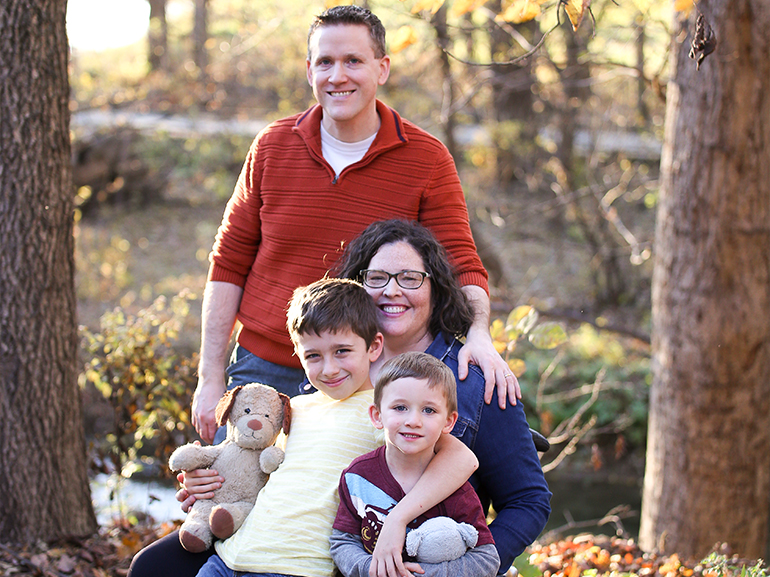Jess' story

Jessica (Jess) Nupponen, 43, lived a busy life as a wife, mother of two young children and working as an event planner. Then, an accident changed everything. Jess was admitted to Penn State Health Milton S. Hershey Medical Center after falling down a flight of stairs and contracting necrotizing fasciitis, a rare and very serious bacterial infection. She underwent four different surgeries to stop the spread of the dangerous bacteria. At one point, a decision had to be made – save her leg or save her life. The surgery team removed her left leg from the hip down. After two additional procedures to clean the surgical wound and remove damaged tissue, Jess was medically stabilized and ready to continue her recovery journey.
Jess chose Penn State Health Rehabilitation Hospital and met her care team, which included therapists and specialists trained in amputation and wound care management. Together, they worked with Jess to help reach her goals, which included returning to life as a full-time spouse and mother and returning to work. “I was very overwhelmed by everything that was happening, but my husband and I talked and we both knew it was absolutely the right choice,” said Jess. “Each day, the wound care registered nurse came to my room and changed the dressings, which were very complicated and she explained each step to me so that I could understand the process of healing.”
In addition to wound care management, Jess participated in a rehabilitation regimen that included physical, occupational and recreational therapy customized for her. “I was blown away by how much everyone here truly cared about me and my recovery,” said Jess. “It gave me a great sense of relief to know I was in such skilled and compassionate hands.”
During physical therapy, Jess completed resistance exercises, functional strengthening, transfers from her wheelchair to other surfaces and standing in the parallel bars to strengthen her right leg. Mini squats, hopping, knee extensions, and standing tolerance were performed to maximize gluteal strength in weight bearing positions. This was all done to prepare her for her eventual prosthesis and also become independent enough to safely return home.
In occupational therapy, Jess learned to adapt to her “new normal” and developed strategies that focused on self-care tasks such as meal preparation, laundry and showering. Jess was taught proper positioning and stretching strategies to maximize range of motion. A reacher became a handy piece of equipment for Jess due to balance challenges. She also utilized equipment such as a drop arm bedside commode and transfer board until she was able to perform stand pivot transfers on one leg. Functional activities completed with wrist weights helped to increase upper body strength and endurance. Jess also practiced getting in and out of a car by using a transfer board and techniques such as sitting down and managing her lower extremities in the direction that worked best for her.
In recreational therapy, Jess received wheelchair training and also learned about local support groups and resources for adaptive recreation. They got her set up with a handicapped plaque for the car and helped to assist her in getting back to work at the library where she is an event planner. Jessica is a chalk artist so the recreational therapist provided her with a long pole that had chalk attached to one end so she could continue her chalk drawings from her wheelchair, since getting down to the ground was difficult. She decorated the sidewalk and entry way of the hospital.
The whole team of therapists, nursing staff and doctors worked together to make sure that Jess’s home was wheelchair-friendly and ready for her arrival. “They were a rock for me and for my family when we needed it most. The whole staff -- from the custodial team to food services, from the therapists to the nursing staff, from the transport team to the doctors to my case manager and everyone in between – they all demonstrated empathy and a solid understanding of my physical and emotional needs.”
During her first stay, which lasted six weeks, she was discharged independent from a wheelchair level for all self-care and transfers. Her mobility was using the wheelchair which she managed without any assistance. Jess was so pleased with her recovery at Penn State Health Rehabilitation Hospital that she returned a year later for prosthetic leg training and will be continuing her training through outpatient services. During her two-week stay, she was able to complete a full meal preparation activity while standing on her new prosthesis. The meal was packaged and given to her husband and children for a home cooked meal in take-out fashion.
When asked about her second experience here she said, “It couldn’t have been better. Seeing so many friendly faces felt like a bit of a homecoming. So many of the staff members remembered me from a year ago and were genuinely pleased to see how far I had come. This is a new beginning.”